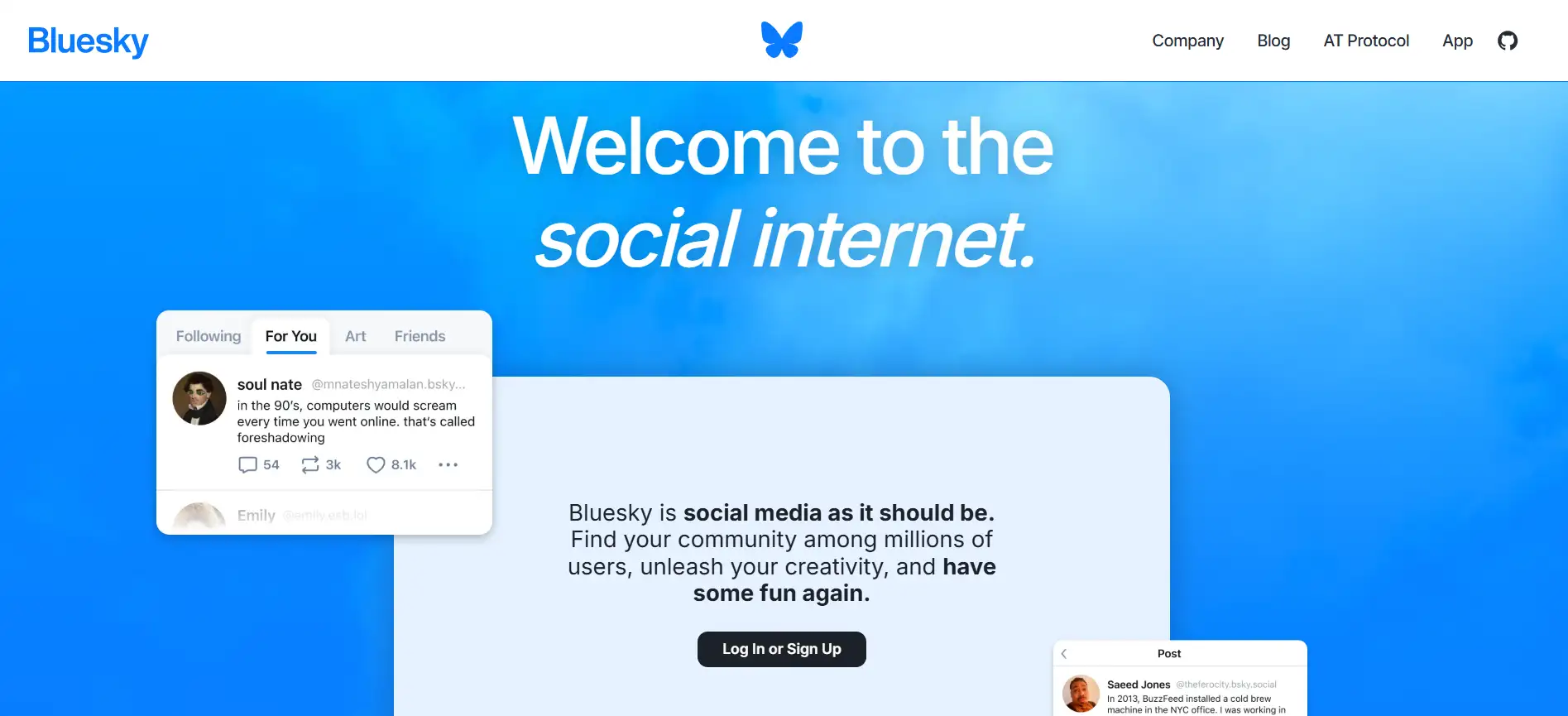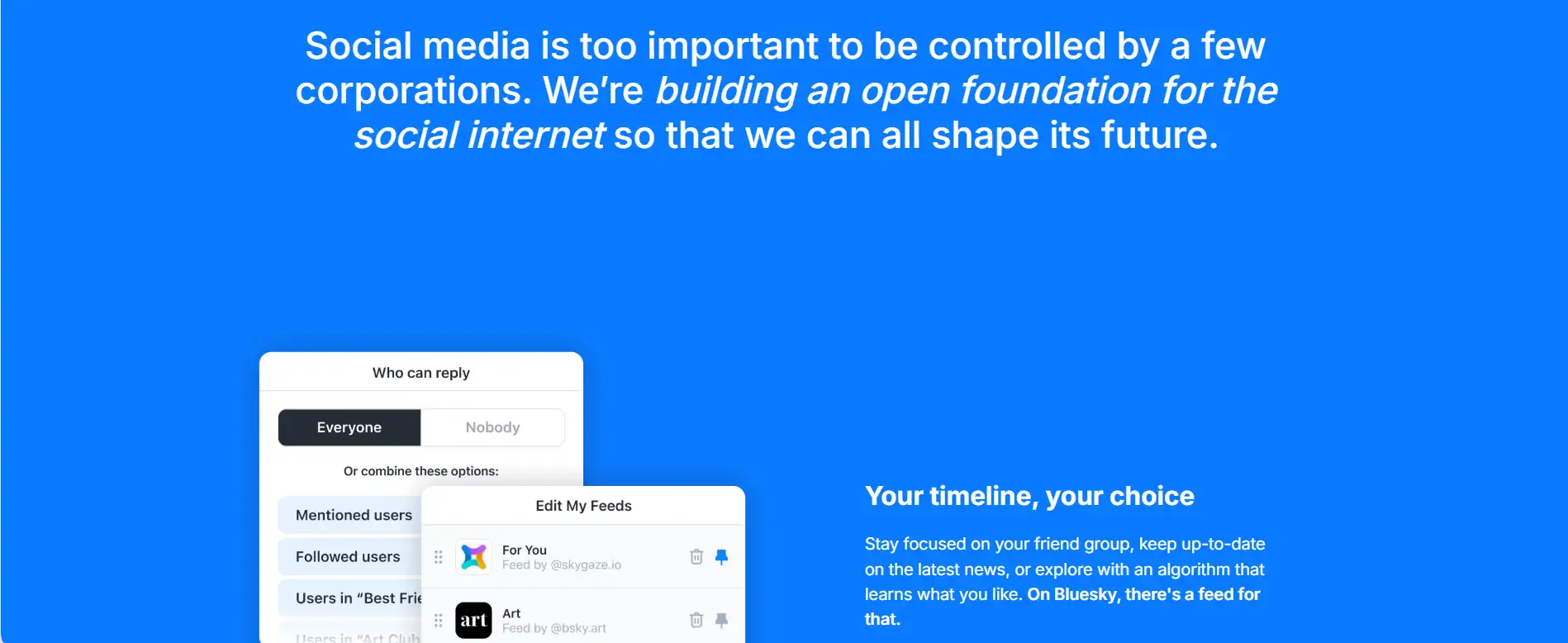About Bluesky
Bluesky is a next-generation decentralized social media platform designed to return control of online conversation back to users, developers, and creators. By leveraging the open and federated AT Protocol, Bluesky provides a social experience that’s customizable, portable, and not governed by a single corporate entity. With over 30 million users and growing, it enables truly open public discourse on a platform that promotes innovation and transparency.
What sets Bluesky apart is its commitment to building the social internet in the spirit of the early web—open, interoperable, and owned by its community. Whether you're looking to engage in global discussions, create your own custom algorithmic feeds, or build third-party clients and moderation tools, Bluesky empowers you with the freedom to shape your own digital world.
Bluesky is more than a social media platform—it's a decentralized ecosystem built to challenge the dominance of centralized platforms like Twitter and Facebook. At its core, Bluesky runs on the open-source AT Protocol, a federated protocol that allows for identity portability, customizable feeds, and composable moderation. This infrastructure gives users unprecedented ownership of their online identity, content, and network—breaking away from platform lock-in and corporate overreach.
On traditional platforms, users are confined within a single network controlled by one company. If a platform changes its rules, users and developers alike have little recourse. With Bluesky, however, the architecture allows anyone to move their data, username, and social connections between servers without losing content or followers. This approach makes the platform resilient and future-proof, ensuring that no individual or organization can monopolize the user base.
A standout feature of Bluesky is its support for custom algorithmic feeds. Users can choose from thousands of independently created timelines or even build their own—placing control over the feed experience into users’ hands. This contrasts starkly with centralized networks that impose opaque and profit-driven algorithms. Tools like Skyfeed, Deck.blue, and Graysky exemplify the thriving developer ecosystem building on Bluesky’s open APIs.
Moderation on Bluesky is similarly decentralized and composable. Instead of enforcing a one-size-fits-all policy, the network allows individuals, communities, and third-party services to apply and subscribe to their own sets of moderation rules. This empowers people to create spaces aligned with their values, while still participating in a broader global conversation. Features like mute lists, block lists, and label subscriptions provide granular control over what users see in their timelines.
Governance-wise, Bluesky operates as a Public Benefit Corporation led by founder Jay Graber, with a mission to support public, decentralized discourse. Initially incubated by Twitter in 2019, it has since become fully independent, and continues to evolve as a community-led alternative to closed social platforms. The team includes leading figures from open protocol development and is backed by decades of research into internet-scale systems and data architecture.
In contrast to other federated platforms like Mastodon, Bluesky emphasizes global discovery, seamless portability, and user choice. Mastodon ties identity to individual servers, limiting portability and visibility. Bluesky, by comparison, separates identity and hosting, enabling a global feed experience while preserving decentralization. This innovative model positions Bluesky as a forward-thinking alternative in the evolving landscape of Web3 and decentralized social media.
Bluesky provides a wide range of features and advantages that set it apart in the decentralized social networking space:
- Decentralized by Design: Built on the AT Protocol, Bluesky allows users to move freely between servers while retaining their data, followers, and identity—an essential upgrade from traditional locked-in platforms.
- Custom Feeds: Users can choose from over 40,000 algorithmically curated timelines or create their own. Whether it's sports, news, or niche interests, you have total control over your social media experience.
- Composable Moderation: Instead of a single, opaque set of rules, Bluesky supports multiple moderation services, blocklists, and filters. You decide what content you want to see and how it’s moderated.
- Open Developer Ecosystem: Use Bluesky’s public APIs to build bots, clients, and feeds. Developers can create new features or full alternative frontends like Deck.blue or Skyfeed.
- Federated Infrastructure: Users aren’t tied to any single server. Switch hosting without losing your username or social graph, much like switching your mobile carrier while keeping your number.
- Public and Transparent: Posts and interactions are public by default, creating a shared social space. The open design encourages better community norms and more honest development practices.
- No Blockchain or Tokens: Bluesky doesn’t rely on cryptocurrency or blockchain technologies, avoiding the complexity and cost that often come with them.
Getting started with Bluesky is simple and open to everyone. Here’s how to begin building your experience in the decentralized social web:
- Download the App: Go to bsky.app and install Bluesky from the App Store, Google Play, or use the web version on desktop.
- Create Your Account: Sign up without needing an invite code. Your username can even be linked to your own domain name.
- Set Up Your Profile: Upload a profile picture, bio, and links. You can also customize your handle using your domain for more control over your identity.
- Explore Feeds: Click the hashtag icon to browse and follow custom feeds. Add any algorithmic feed that matches your interests, or create your own using tools like Skyfeed.
- Follow Users and Start Posting: Begin building your timeline by following mutuals, creators, or topical accounts. Post updates, images, and links just like any other social platform.
- Customize Moderation: Subscribe to moderation lists or use your own block/mute filters to personalize what shows up in your feed. This makes Bluesky feel like home, no matter your community’s values.
- Develop or Integrate Tools: If you're a builder, use the Bluesky developer docs to create apps, feed generators, or moderation services that plug into the open network.
Bluesky FAQ
Yes, that's one of Bluesky’s core features. Built on the AT Protocol, Bluesky offers full account portability. This means your posts, followers, and username aren’t tied to any single server. If you decide to switch to another hosting provider, it’s like changing phone carriers—you keep everything, including your "number" (handle) and all your social data.
Bluesky gives you the power to pick or build your own algorithms—something no mainstream social network currently offers. You can follow over 40,000 algorithmic feeds or create your own using tools like Skyfeed. This means your experience is not dictated by corporate algorithms, but by your own preferences and community-generated options. Explore feeds via the hashtag icon in the app.
Unlike centralized platforms where rules are top-down, Bluesky uses composable moderation. You can subscribe to public blocklists, apply filters, and even bring in third-party moderation services. This creates a layered approach to safety where communities can define their own norms. Bluesky’s moderation model is open-source, adaptable, and gives power back to users.
No. While developers can dive deep using Bluesky's public APIs and starter kits, non-technical users can still create and share custom feeds using tools like Skyfeed’s feed builder. As the ecosystem matures, expect more no-code tools that make it easy for anyone to contribute to the network, whether through feeds, moderation tools, or user-facing apps.
No. Bluesky is building a new kind of social ecosystem—one that’s open, federated, and not controlled by a single company. While it offers a familiar microblogging experience like Twitter or Mastodon, Bluesky is based on different architecture. Unlike Mastodon, your identity and timeline aren’t tied to your server. Unlike Twitter, you can move your data, customize moderation, and choose your feed algorithms.
You Might Also Like












